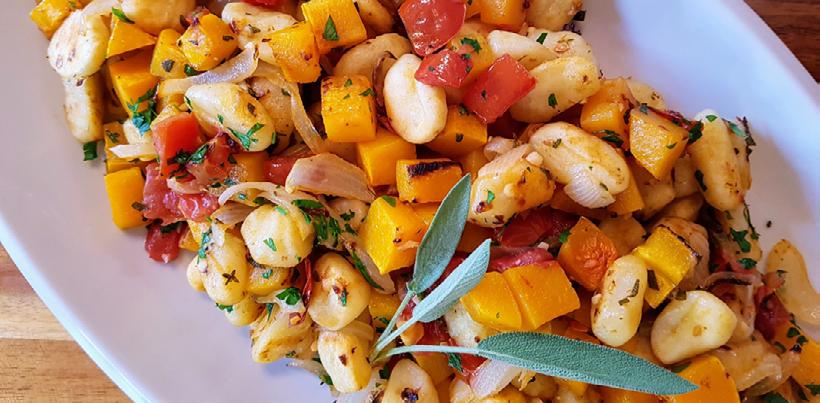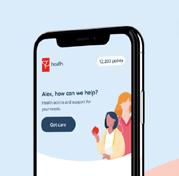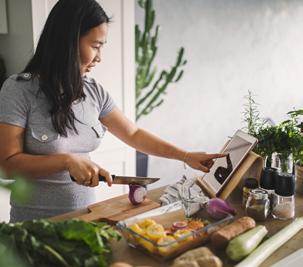Prevention toolkit 7 easy steps to reduce your risk
When it comes to preventing heart disease and stroke, small changes can bring big results. Here are seven simple things you could try today to get started on better heart and brain health.
All recipes are approved by Heart & Stroke dietitians and can be found at heartandstroke.ca/recipes

1
Eat more plant protein
Plant-based foods can help reduce blood pressure and cholesterol levels, and lower your risk of developing heart disease. Try swapping out meat or poultry occasionally for beans, lentils, tofu or nuts, and round out your meals with vegetables and whole grains. Here’s a delicious entrée to get you started. Find more at heartandstroke.ca/recipes
Step
Roasted squash and gnocchi toss
Directions
4-6 servings
20 min
Ingredients
3 cups (750 mL) chopped butternut squash
2 large plum tomatoes, chopped
1 pkg (500 g) potato gnocchi
1 onion, sliced
2 tbsp (25 mL) sodium-reduced vegetable broth
1 tbsp (15 mL) extra virgin olive oil
1 large clove garlic, minced
1 tsp (5 mL) each chopped fresh thyme and sage leaves
1/4 tsp (1 mL) hot pepper flakes
1/4 cup (50 mL) fresh grated parmesan cheese
2 tbsp (25 mL) chopped fresh parsley
Tip: The hot pepper flakes add a little zip to this dish. If you are not a fan of heat or spice simply reduce the hot pepper flakes to a pinch.
1. In a large bowl, toss together squash, tomatoes, gnocchi and onion.

2. In a small bowl, stir together broth, oil, garlic, thyme, sage and hot pepper flakes. Pour over squash mixture and toss well to coat evenly.
3. Spread mixture onto parchment paper lined baking sheet in a single layer. Roast in preheated 450F (232C) oven for 12 minutes. Using a flat spatula, flip gnocchi mixture over and continue to roast for about 10 minutes or until golden and squash is tender.
4. Scrape into serving bowl and toss with cheese and parsley to serve.
Nutrition info per serving (1 of 4)
• Calories 321 • Protein 11 g
• Total fat 6 g: Saturated fat 1.5 g • Cholesterol 6 mg
• Carbohydrates 64 g: Fibre 4 g • Sugars 6 g • Added sugars 0 g
• Sodium 384 mg • Potassium 994 mg
2
Recipe developed by Emily Richards, PH Ec.
# 1
High blood pressure is the number one risk factor for stroke and a major risk factor for heart disease. To reduce your risk, try Yours to Control, an 8-12-week program developed by Heart & Stroke experts for the PC Health app. The program helps you develop and maintain healthy habits that can help manage your blood pressure and lower your risk for heart disease and stroke. Get the app at pchealth.ca, then find Yours to Control in the chronic care program library, and earn PC OptimumTM points along the way.



3 Step # 2 Take charge of your blood
pressure
1 Buy produce when it’s in season to keep it affordable and full of flavour. And remember, the best way to keep produce fresh is to eat lots of it every day! 2 Keep containers of sliced vegetables and fruit front and centre for a quick, healthy snack. 3 Home cooking is one of the best ways to limit salt and sugar. Use refrigerated leftovers within three or four days and freeze unused portions. 4 Replace sauces and dressings with lower sodium options — check Nutrition Facts panels. Better yet, make your own! Give your fridge a makeover Step # 3 5 Stock up on affordable frozen vegetables and fruit — watch for sales! They can stay in the freezer for about eight months. Best buys have no added oil, butter, sugar, salt or sauce. Try these tips to make heart-healthy food choices a snap.
Boost your omega-3s
These heart-healthy fats may decrease your risk of heart disease. A key source is fatty fish. Try this salmon recipe and find more at heartandstroke.ca/recipes.
Lemon flax and parsley salmon
Directions
1. In a small bowl, stir together flax, parsley, lemon zest and chili powder; set aside.
Ingredients
2 tbsp (25 mL) ground flax (flax meal)
1 tbsp (15 mL) chopped fresh parsley
1 tsp (5 mL) grated lemon zest
1/2 tsp (2 mL) chili powder
4 boneless skinless salmon portions (about 4 oz/125 g each)
1 tsp (5 mL) canola oil
Lemon wedges (optional)
Plus, try these fish sources of omega-3s:

• Herring
• Mackerel
• Sardines (canned)
• Trout
• Tuna (canned, white)
2. Place salmon portions onto parchment paper lined baking sheet. Brush salmon with oil and sprinkle tops with flax mixture. Press flax mixture gently on top to help stick. 3. Roast in preheated 425 F (220 C) for about 12 minutes or until fish flakes when tested with fork. 4. Serve with lemon wedges, if desired.
4
4 servings 17 min
Recipe developed by Emily Richards, PH Ec.
Nutrition info per serving (1 of 4) • Calories 210 • Protein 20 g • Total fat 13 g: Saturated fat 2.5 g • Cholesterol 0 mg • Carbohydrates 55 g: Fibre 1 g • Sugars 0 g • Added sugars 0 g • Sodium 60 mg • Potassium 380 mg
Step # 4
Stand up for your health
Sitting for extended periods increases your chances of getting diabetes and heart disease, even if you’re active. If you sit most of the time at home or work, set a timer to remind yourself to get up every 20 minutes and move around for two minutes.

Improve your sleep
Healthy sleep supports your heart and brain health, and it’s even more critical if you’re living with heart disease or stroke. These tips can help you get better shut-eye.

• Keep to a consistent sleep schedule, even on weekends.
• Sleep in a dark, quiet and cool bedroom.
• Finish eating two hours before bedtime.
• Avoid caffeine within six hours of bedtime.
• Don’t drink alcohol within two hours of bedtime.
• Avoid electronic screens before bedtime and if you wake up during the night.
Cut back on ultraprocessed foods
Research shows they make up almost 50% of our calories, and they’re harming our health. Ultra-processed foods include soft drinks, chips, chocolate, candy, ice cream, sweetened breakfast cereals, packaged soups, luncheon meats, hotdogs, fries and more.
Reduce your risk for heart disease and stroke by focusing on fresh, minimally processed whole foods. Cooking more at home and enjoying meals with family and friends makes you less likely to binge on ultra-processed treats.

5
Step # 5
Step # 7 Step # 6

Beat heart disease Beat stroke Beat sudden devastation Beat inequity Beat the unknown heartandstroke.ca ©
and
of
2022 | ™ The heart and / Icon on its own and the heart and / Icon followed by another icon or words are trademarks of the
and Stroke Foundation of Canada.
Heart
Stroke Foundation
Canada,
Heart










